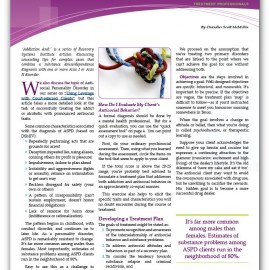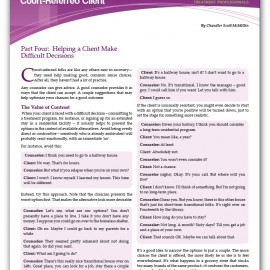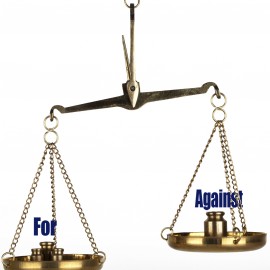Topic: client types and needs
Addiction And: ASPD
With a little leverage and some understanding of effective therapeutic technique, you can increase the chances of successful outcomes with these clients.
Topics: addicted offenders, alcoholism, assessment, client types and needs, co-occurring disorders, counseling skills, personality disorders
Complex Case: The Devil We Know
There’s this big group we lump under the heading ‘precontemplation’. But in practice, there are precontemplators, and pre-pre-contemplators, and pre-pre-pre-pre-pre-contemplators.
Topics: client types and needs, clinical management, co-occurring disorders, treatment models
Complex Trauma: A Practical Approach
We can’t always predict which problem will require attention first — or indeed, when opening a door in therapy will introduce a whole new set of emotional needs and issues.
Topics: assessment, client types and needs, co-occurring disorders, compulsive behavior, therapeutic models, therapies and tools, trauma, treatment planning
Using Leverage in Counseling the Court-Referred Client, Part 6
A big fine, for instance, isn’t necessarily a better deterrent than a lesser one that is administered quickly and effectively.
Topics: client types and needs, compliance and noncompliance, counseling, court-mandated, criminal courts, DUI/DWI, establishing credibility, legal problems, leverage, relapse, Using Leverage Series
Using Leverage in Counseling the Court-Referred Client, Part 4
It’s not just what you present to your client — it’s how you present it. By following a few simple rules, you get better results. It’s not a perfect system, by any means. But it should improve outcomes.
Topics: client engagement and motivation, client types and needs, counseling, counseling skills, court-mandated, criminal courts, DUI/DWI, legal problems, leverage, resistance manipulation ambivalence, Using Leverage Series
Finding the Right Opioid Treatment Program
Some of what patients hear is gossip and folklore, something for which the addict community is famous. But there is a wide variation in quality among OTPs.
Topics: client types and needs, finding the right treatment, MAT, opioids, referral, therapies and tools
Engaging Coerced DUI Clients
First, they don’t understand why they’re in treatment, or how it could possibly benefit them. Second, they’re ticked off about having been coerced.
Topics: addicted offenders, client engagement and motivation, client types and needs, DUI/DWI, groups, legal problems















